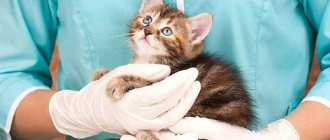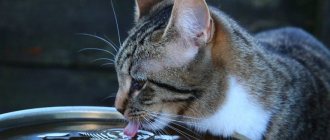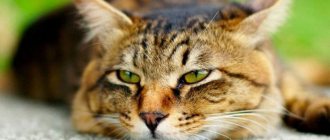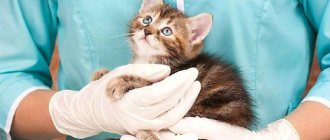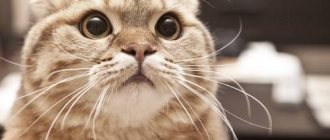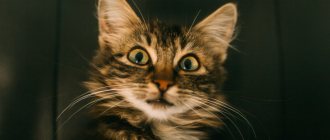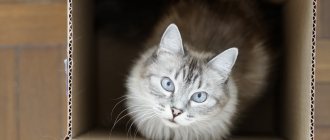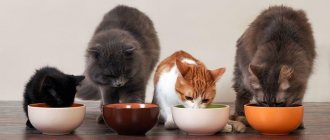Cats are charming and majestic creatures that can be shy or bold, obedient or overly active depending on their mood at any given moment.
As cat parents, we never know what kind of cat we will encounter day to day. Cats go about their business and can have a hard time keeping up while they're hanging around the house or sleeping in the closet.
However, we know our cats and know when something is wrong.
Although cats may behave normally, sometimes they have an interesting habit, you know, just decide that they don't want to eat. There are many reasons why cats may refuse to eat.
There are some simple reasons, but there may be some deeper issues that we need to be aware of.
How does the condition manifest?
In cats, periods of increased activity are usually followed by apathy and drowsiness. It is difficult for owners to understand why and at what exact moments this happens. Therefore, a situation where a cat is lethargic, hardly eats and sleeps a lot, is alarming.
The owner should clearly know that poor appetite and less active behavior do not always indicate an animal illness. And the veterinarian is sometimes unable to understand why the cat is lethargic. The observations of an attentive and loving owner are extremely important here.
The main signs of cat health, in addition to good appetite and good spirits, are:
- shiny and smooth coat;
- pink and slightly moistened mucous membranes;
- cold and slightly damp nose (normally, during sleep it can become warm and dry);
- pulse, respiratory rate and temperature are within normal limits;
- absence of excessive discharge from the eyes, ears and nose, plaque in the mouth, salivation and unpleasant odor from the mouth and ears.
It is important! The normal duration of rest for a cat per day is 12-14 hours or more.
Food poisoning
Cats suffer from decreased appetite for obvious reasons related to eating disorders. As a rule, several symptoms are observed at once :
- nausea and vomiting;
- loose stools;
- general weakness of the animal;
- loss of activity, drowsiness, etc.
If this situation continues for more than a day, exhaustion is observed, it is better to contact a veterinary clinic: you will need to take medications.
Possible causes of lethargy in healthy animals
Often there are reasons why a cat is lethargic, sleeps all the time and eats little, but it is better to understand each of them in order.
Stress
It is not uncommon for a cat to eat poorly and sleep a lot after a serious nervous shock.
Cats are very sensitive animals, so they have many causes of stress:
- travel by car;
- the arrival of a new family member or pet in the house;
- change of owner;
- repair or rearrangement of the house;
- visit to the veterinarian;
- change of place of residence by owners;
- lack of attention from the owner;
- pain;
- recent surgery;
- visit of guests;
- bathing and other hygiene procedures;
- changes in daily routine;
- the appearance of new and unusual objects in the house;
- first time on the street.
Usually cats cope with this situation quite well without medical help, but they really need the support of their beloved owner. However, in some particularly susceptible cats, stress lasts for quite a long time and can even be harmful to health.
The main physiological signs of nervous shock in a cat:
- urinary incontinence;
- rapid breathing;
- diarrhea or constipation;
- increased cleanliness (a cat can lick itself until bald spots appear on its fur and irritation on the skin);
- yawning too often;
- urinating in inappropriate places (the cat is marking its territory).
It is important! If, as a result of stress, the cat’s behavior does not return to normal for a long time, it is better to show the animal to a doctor. After all, nervous shocks can negatively affect his health and lead to the development of diabetes, skin diseases and disturbances in the functioning of the cardiovascular, digestive and genitourinary systems.
Change of feed
Often the cause of a lethargic state and refusal to eat is a change in diet (for example, switching from natural food to ready-made food and vice versa).
In this situation, you should return the cat to its previous food and treat it with some treat. Then the restoration of appetite and a cheerful state will occur very quickly.
Hot weather
Cats do not have sweat glands. They do not know how to cool themselves by opening their mouths, like dogs. Therefore, in the heat, to protect themselves from overheating, furry pets try to lie more in cool places. In addition, they begin to eat less so as not to waste energy on burning calories received with food.
Age
Over time, many owners begin to worry that their once active and nimble cat has become lethargic, eating almost nothing and lying around all the time. This is easy to explain: older cats no longer have as much energy for play; they sleep longer and more soundly than young animals.
If an elderly pet is lethargic, eats without appetite and sleeps a lot, but at the same time drinks water and has the above signs of a healthy cat, then there is no need to worry. However, an older cat should be regularly taken to the veterinarian for examinations to prevent the development of diseases.
Kittens spend almost 90% of the day sleeping until they reach two months of age. If the kitten is lethargic, plays little and eats poorly during periods of wakefulness, then the best solution is a trip to the veterinarian.
It is important! The maximum duration of healthy fasting for kittens is 1 day, for young cats and middle-aged pets – 3 days, and for “old people” – 2 days. If after this time the cat still does not start eating, you need to consult a doctor as soon as possible.
Pregnancy
In the early stages of pregnancy, many cats, like people, suffer from toxicosis. They become lethargic, try to move less and more carefully, sleep more and often refuse to feed.
If a cat was mated 3-4 weeks before this condition, then after another 5-6 weeks you can expect an addition to the cat family.
Diseases
If your cat has lost his appetite and is lethargic, these may be symptoms of some disease.:
- infections;
- inflammatory processes;
- development of benign or malignant tumors;
- dysfunction of the liver, intestines or stomach;
- oral diseases.
Such pathologies lead to anorexia (complete lack of appetite), which can lead to depletion of the body. Therefore, if your appetite has disappeared for no apparent reason. You should immediately contact a veterinary clinic for examination.
© shutterstock
Possible pathological conditions
If the cat has been lethargic for several days, sleeps a lot, drinks and eats poorly, and can barely walk, the owner should under no circumstances let the situation take its course. Such a condition in the pet’s body most likely signals the development of a serious disease. The cat must be shown to a doctor in the next few hours.
Anemia
Anemia occurs when a cat's body produces less red blood cells and hemoglobin.
In addition to the fact that with anemia, a cat is lethargic and sad, it also exhibits other signs of this unpleasant disease:
- the nose becomes lighter;
- mucous membranes acquire a bluish tint;
- blood pressure decreases;
- the pulse is sometimes rapid, sometimes rare;
- breathing accelerates, shortness of breath appears;
- the fur becomes dull and may fall out;
- clear discharge appears from the nose.
Diseases of the cardiovascular system
If the cat eats poorly and constantly sleeps, is lethargic, tries to walk less - these may be signs of the development of a disease of the cardiovascular system.
Your pet may be bothered by fluctuations in blood pressure.
It is important! Normally, blood pressure in cats can “jump” from 105/65 to 135/95 mmHg.
With high blood pressure, furry couch potatoes experience:
- lethargy;
- decreased vision (while moving, the cat may bump into furniture and other objects);
- rapid pulse;
- dilated pupils;
- redness of the eyes;
- sometimes vomiting;
- in some cases - nosebleeds.
With low blood pressure, the pet refuses to eat due to nausea, sleeps a lot, its pulse slows down, and the cat may even lose consciousness.
In acute heart failure, the animal is also lethargic, its breathing becomes difficult, shortness of breath and bluish discharge from the nose appear.
An important symptom of the development of heart disease in a cat is its characteristic posture in a relaxed state. She usually stands with her front legs spread wide. This makes it easier for her to breathe.
Gastrointestinal diseases
Often the cause of a pet's lethargic and sleepy state and his refusal to eat are diseases of the gastrointestinal tract.
With gastrointestinal pathologies, a cat may exhibit symptoms:
- bloating;
- stools that are very dark, almost black, or mixed with blood and mucus;
- belching;
- constipation;
- flatulence.
Diseases of the urinary system
The development of urinary system diseases in cats, in addition to a lethargic state and lack of appetite, is accompanied by symptoms:
- too frequent or infrequent urination, or its complete absence;
- constant pain when urinating;
- the appearance of blood or pus in the urine;
- sweetish smell from the mouth;
- lower back pain;
- extremely unpleasant odor of urine.
To reduce pain at least a little, the animal lies down almost all the time, does not drink or eat.
It is important! If your pet has a blockage in the urethra, without medical attention he may die within 3 days.
Infectious diseases
In many cases, a cat’s lethargic behavior, refusal to feed and staying in almost constant sleep indicate an infectious disease.
Such diseases are extremely dangerous for cats and require immediate medical attention. The owner must remember that the life of his pet is literally counted in minutes.
The most dangerous infectious diseases that cause cats to become very lethargic are:
- Leptospirosis: Caused by the bacterium Leptospira. The disease affects almost all cat organs and is very dangerous for humans;
- Calcivirosis is a viral disease that affects the respiratory tract. It occurs mainly in cats under 2 years of age, but sometimes in older individuals;
- FIV is feline viral immunodeficiency: an extremely dangerous disease that affects the immune and nervous systems. Only representatives of the cat family, including wild representatives, can become infected with it;
- Panleukopenia (popularly called feline distemper) is a deadly disease that develops very quickly. It affects the cardiovascular, digestive and respiratory systems of the cat and is accompanied by intoxication of the entire body;
- herpes virus infection (another name is rhinotracheitis): caused by the feline herpes virus. Affects the respiratory and visual organs. If the animal is weakened by other diseases and does not receive proper treatment, the infection can lead to death.
The main signs of a cat becoming infected with a dangerous infection:
- lethargy and apathy;
- lack of appetite;
- high body temperature (above 40°C);
It is important! Normal body temperature in adult cats is 38-39°C, in small kittens – 38-39.6°C, in sphinxes – 38-41.5°C.
- labored breathing;
- cough and wheezing;
- vomit;
- foul, greenish diarrhea;
- bloody discharge from the mouth, nose, ears, eyes;
- soreness in some parts of the body.
Intoxication
Poisoning of the body (intoxication) in cats, in addition to lethargy and refusal to eat, is indicated by:
- diarrhea;
- vomit;
- increased salivation;
- increase or decrease in body temperature;
- redness or blueness of mucous membranes;
- constant feeling of thirst;
- convulsions and so on.
If you suspect poisoning, you should try to induce vomiting in the cat so that the body can at least partially get rid of toxins, and then take it to the veterinarian.
However, if more than 2.5 hours have passed since the poisoning, it is better to transport the pet to a veterinary hospital as soon as possible. After all, during this time, toxic substances have already spread throughout the circulatory system throughout the body.
In order to protect your furry pets from intoxication, you need to know its main causes:
- stale or poor quality food;
- contaminated drinking water;
- bites of snakes and poisonous insects;
- helminth infection;
- bacterial and viral infections;
- violation of hygiene rules when keeping animals;
- eating poisonous plants, fertilizers, chemicals;
- uncontrolled use of medications;
- individual intolerance to certain components of feed, hygiene products, etc.;
- exposure to toxic fumes from paint and varnish products.
Parasites
The cause of lethargic behavior and drowsiness can be a cat’s infection with external and internal parasites (fleas, ticks, worms).
Flea and tick bites cause itching and pain in cats. As a result, due to constant scratching, wounds appear on the skin, and the hair begins to fall out.
A cat with ear mites often shakes its head and scratches its ears, in which a lot of wax with an unpleasant odor can be found.
Cats infected with worms are often lethargic. Other signs of the disease:
- bowel disorder (diarrhea or constipation);
- vomit;
- itching and irritation in the anal area;
- temperature increase;
- bloating;
- the presence of eggs and particles of worms in the feces.
If external or internal parasites are detected in your pet, you need to begin exterminating them as soon as possible. The veterinarian will prescribe the medications.
The fight against parasites is very important, because they are quickly transmitted to both other animals and humans.
How to help your pet
The best help for your pet is to see a doctor. An exception may be situations when you are absolutely sure that such a condition is caused by stress. For example, a recent move to a new place of residence or the arrival of a new pet or family member. But even here your cat needs help. There are special medications that will help the animal calm down faster and enter the usual rhythm of life (for example, Kot Bayun infusion, collar or Feliway spray).
Feliway is a specially developed pheromone for cats that helps normalize the pet’s behavior in a stressful situation.
Before visiting the veterinarian
Before visiting the veterinarian, the owner can independently take measures to somehow alleviate the pet’s condition:
- Ensure peace and quiet, remove light irritants (dark windows).
- If possible, isolate from other pets (if there are any in the house) in case of an infectious disease.
- Place the pet on a clean bedding, not too soft, but comfortable.
- Place clean water and some of your favorite food next to your pet.
- You can force the cat to drink from a syringe without a needle (2-3 ml every half hour). This must be done if your pet has diarrhea or vomiting, or if the sick person is a kitten.
Drinking from a syringe is a necessary measure to prevent dehydration.
- If there is grass specially grown for your pet, offer it.
You cannot give any medications on your own without the advice of a veterinarian. They can smooth out the symptoms, and it will be more difficult for the doctor to understand the true cause of the cat’s ill health.
You can call your veterinarian by phone and get advice . He will not make a diagnosis over the phone, but he will be able to give some professional recommendations that can help the animal before arriving at the clinic.
I always have a piece of paper pinned with a magnet on my refrigerator with the veterinarian’s number (it’s also written into my phone’s contact book). I usually call to find out a convenient time to accept my pets (so as not to sit in line later). But one day I needed a consultation when the cat was vomiting (she was poisoned by something, as it turned out later, but we did not identify the exact source, because she was walking in the yard and could have eaten anything). The clinic was no longer open (it was evening), and over the phone the doctor advised me to feed the cat Enterosgel and forcefully give her water. This way we were able to hold out until the morning, when the cat was able to receive help at the clinic (including putting on an IV).
After receiving doctor's orders
After the veterinarian has made a diagnosis and prescribed treatment, you should strictly follow all his recommendations. Do not hesitate to clarify all the details regarding taking medications.
Never stop treating your pet before the time prescribed by your doctor, even if it seems to you that he has completely recovered. Infectious diseases require a full course of therapy.
Perhaps the doctor will advise changing the diet, making it more gentle on the pet’s gastrointestinal tract. Special lines of well-known brands of cat food may be suitable, for example:
- Gastro Intestinal from Royal Canin;
Royal Canin Gastro Intestinal - diet for cats with digestive disorders
- Vet Life Cat Gastrointestinal from Farmina;
- PRO PLAN Veterinary Diets EN Gastrointestinal;
- Hill's Prescription Diet Feline i/d.
Additional recommendations
Following these recommendations will help your cat recover faster:
- A calm environment will help your cat get out of stress. You should not force your pet into games and communication.
- If your pet refuses the new diet, go back to the old one. If this is not possible, look for other cat food options (some animals refuse certain brands, so trial and error is the only way to find the right food).
- Ecto- and endoparasites are destroyed using special preparations. There is no need to use them before visiting a doctor, but in the future it is always better to use them for prevention.
- Inflamed gums can be treated with a solution of chlorhexidine or manganese (faint pink). This procedure is carried out twice a day. A piece of gauze is soaked in a medicinal solution and gently pressed onto problem areas of the oral cavity without applying pressure. Depending on the affected area, you can also use cotton swabs, precisely treating the desired areas.
Other pathologies
In addition to the listed pathological conditions of cats, accompanied by lethargy, drowsiness and loss of appetite, the following painful conditions also occur:
- disturbances in the functioning of the endocrine system.
For example, after sterilization or childbirth due to hormonal imbalance, cats become lethargic and inactive.
Pets suffering from diabetes also do not want to move too much. In addition, such cats are constantly thirsty, eat a lot or very little, and often go to the toilet. They experience weight fluctuations, their vision deteriorates, their stomach enlarges, their muscles weaken;
- oncological diseases.
One of their symptoms in cats is a lethargic state. Changes in the pet’s well-being are clearly visible: the cat hardly eats, lies down all the time, vomits, and experiences internal bleeding. Such animals have very unpleasant breath, and upon visual examination, swelling and ulcers can be detected on the body;
- diseases of the musculoskeletal system.
Even an inexperienced owner can easily recognize them. With arthritis, dislocations, sprains, osteochondrosis, fractures and other problems, animals become lethargic, try to eat and move less. Cats' affected joints swell, they limp, rarely sharpen their claws and wash themselves. All movements cause them pain;
- complications after surgery.
Usually, in the first three days after the intervention, cats are very lethargic. This condition, in the presence of appetite and thirst, is considered normal.
But, if the animal’s temperature rises, blood or pus begins to ooze from the wound, vomiting or constipation often occurs - you need to contact the clinic as soon as possible. After all, these can be dangerous symptoms of suture dehiscence or suppuration, or the formation of a hernia.
Eating problems
Sometimes owners do not pay much attention to what they feed their pet. If the diet is too monotonous, the question may later arise of what to do if the cat loses its appetite. Obviously, the animal may get tired of the same food over time, so the cat will be extremely reluctant to eat it. Then it is enough to introduce new components - feed or familiar homemade food.
© shutterstock
Another problem is insufficiently high-quality products, for example, sausages, pates of dubious composition, cheap food from little-known manufacturers, etc. It is important to pay attention to the composition and, if necessary, consult a veterinarian. It is possible that even some normal foods are contraindicated for your cat due to the characteristics of the digestive system.
Causes
Each of the different types of dysphagia is caused by different factors.
Oral dysphagia may be caused by:
- Paralysis of the jaw or tongue
- Muscle swelling
- Mouth injury
- Dental disease or infection
Pharyngeal dysphagia may be caused by:
- Cancer
- Enlarged lymph nodes near the throat
- Abscesses
- Inflammation of the pharynx
Cricopharyngeal dysphagia may be caused by:
- Tight or wasted muscles
- Nerve damage
In some cases, the reason why a cat cannot swallow may be neurological. If your cat suffers from a brain disease or rabies, dysphagia may be one of the side effects of this condition.
What to do
The treatment plan for dysphagia will depend on the underlying cause. If an infection is causing the problem, antibiotics will be prescribed, but if the problem is inflammation, steroids may be prescribed instead. Both of these medications may need to be administered to your cat at home for up to ten days.
If a tight or contracted muscle is causing your cat to gag and cough, your veterinarian may prescribe muscle relaxers to help the muscle relax and allow your cat to swallow.
If the cause is some kind of structural damage or abscess, surgery may be required to correct the problem.
If the biopsy shows that there are cancer cells in the abscesses, your veterinarian will discuss various chemotherapy and radiation treatment options with you.
Finally, dental disease may need to be treated by removing infected teeth and administering antibiotics.
What should an owner do if a cat doesn’t eat well?
If the cat feels cheerful and cheerful, has normal bowel movements, and the hunger strike lasts no more than 2 days, then the owner can be calm. It would be a good idea to try to gradually introduce some new foods into the diet, depending on what your cat’s diet is. If the animal eats natural food, then it makes sense to offer it some new but healthy products. If your animal's menu included industrial food, you can purchase a new type - for cats that are picky eaters. But any food should be introduced gradually and the animal should not be forcefully fed.
At the pet store you can buy sprouted grass, vitamin complexes, and special cat treats, especially during the changing seasons. Do not neglect preventive vaccinations, deworming, and prevention of external blood-sucking parasites. In short, the owner should not sound the alarm if the cat is apparently healthy and the refusal to eat continues for several (1-3) days. But any symptoms of ill health should always be noticed by the owner and serve as a reason to contact a specialist so that the reason why the cat is not eating well can be identified and eliminated.
Symptoms of Difficulty Swallowing in Cats
There are three types of dysphagia, each of which can present with specific symptoms.
Oral dysphagia
- Struggling to open the mouth or keep food in the mouth
- Collect food from the sides of the mouth
- Throws back head to eat
© shutterstock
Pharyngeal dysphagia
- Repeated attempts to swallow
- Gagging
- Coughs
- Drooling
- Blood stains in saliva
- Excessive chewing before attempting to swallow
- Unusual movements of the neck and head while eating
Cricopharyngeal dysphagia
- Regurgitation of food
- Weight loss
- Loss of appetite
- Repeated attempts to swallow
- Gagging
